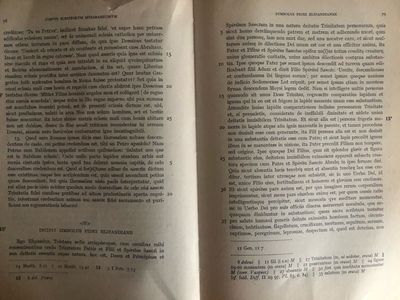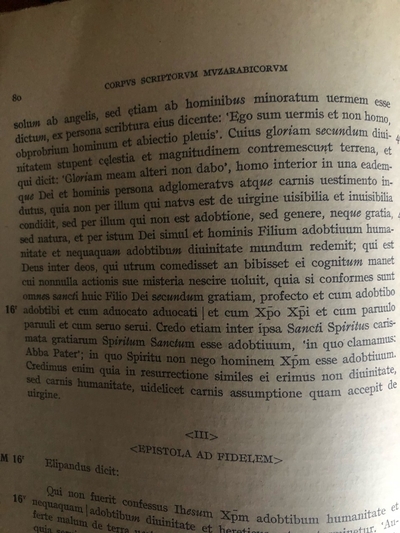Having previously translated and commented on Bishop Elipandus of Toledo's refutation of the alleged teachings of the heretic Migetius, I thought it would be worthwhile also to translate the 'Symbol of the Elipandian Faith,' which contains a concise outline of Elipandus' own view of the Trinity. While the standard conception of the Trinity as three persons in one divinity and the equality of the persons in substance and eternity are reflected in this document, the departure that ultimately led to the condemnation of Elipandus for heresy was the idea of 'adoptionism,' which posits that Christ, in his human nature form as the son of the Virgin Mary, was the 'adopted' Son of God, contrasting with the divine nature of the Son of God in the Trinity in which there is no adoptive Father-Son relationship. With the 'emptying out' of the deity (Latin verb: exinanire) that is likened to God's appearance to Abraham apparently in the form of three men (cf. Genesis 18), the man who became the adopted Son of God made salvation possible for mankind. The point then is that if we concord with him in grace, we too can become adopted sons of God, whereas we cannot be sons of God in terms of sharing in divinity. Indeed, in the resurrection, we are similar to the Son of God in humanity of flesh and not divinity.
I would like to dedicate this translation and commentary to Zahra, another dear friend who has also told me that she did not understand the doctrine of the Trinity.
The edition of the Latin text used is that contained in Juan Gil's Corpus Scriptorum Muzarabicorum. I have added as notes the Biblical references Gil noted, but there are others that he seems to have missed and so I have inserted them.
---------------------------------------

Begins the Symbol of Elipandian Faith
I Elipandus, the archbishop of the Toletanian seat, believe, along with all who agree with me, in the Trinity of the Father, the Son and the Holy Spirit in one essence of deity and nature, that is, God, the Beginning, and the Holy Spirit in one nature of deity as a Trinity of persons: that just as when man leaves his father and mother and takes a wife, although they are two persons, now they are not two, but it is called one flesh,[i] and just as the souls of the many are in the love of God one heart and are made one soul, so also the Father, the Son and the Holy Spirit are one maker of all established creation, the gathering of one kindness, the co-eternal substance of one display of love. Also the Father descended by Himself to the tower which the sons of Adam built and He said to the Son and the Holy Spirit: 'Come, let Us descend and confound there their tongues'[ii]; coming also by Himself, He took away Lot from the judgement of the Sodomites,[iii] also by Himself descending onto Mount Synaa,[iv] He gave Moyses the law.
For if you want to understand the persons, how one God is the Trinity, consider by comparison that the stone and fire which is in it, and with the cold remaining in the stone, are one substance. Consider the comparison of this stone as the Trinity is undivided in persons and, if you can, consider regarding the ineffable divinity and see the invisible Trinity of one deity. And just as there is one person of the cold that remains in the stone and one of the fire that remains in the parent, and nonetheless coming forth it does not cease to be with the generator, so the person of the Son is another and does not cease to be in the one substance of the deity with the Father; and just as the stone precedes in vision the fire that remains in it, so also the Father precedes the Son not in time, but in origin. Also the Son of God, as he is the splendour of glory and the figure of His substance, appeared emptying out the invisible deity, taking on the appearance of subject creation, with the Father and the Holy Spirit, to Abraham in the heat of the day.[v] So just as darkness is the absence of light and the absence of darkness is believed to be light, the third does not subsist among both, thus we believe that in the one Word of God- that is, His only Son- are fortitude, honour and glory. And as the spirit is part of the soul, through which images of corporeal matters are engraved, so the mind is part of the same soul, through which all reason and intelligence are perceived, as memory which is contemplation in remembrance, and thus in the Word of God they have merited different names for their duties, which are in no way divided in substance.

The sacred scripture testifies that the man was made for the salvation of the human race with the deity emptied out, and that he was circumcised, baptised, whipped, crucified, killed, buried, slave, captive, traveller, leper, despised, and, which is even lower, called a diminished worm not only by the angels, but also by men, with the scripture saying from his person: 'I am a worm and not a man, the disgrace of men and cast-away of the people.'[vi] His glory according to the divinity, the celestial things marvel at, and the earthly things tremble at His magnitude, and the one who says: 'I will not give My glory to another,'[vii] the internal man gathered in one and the same person of God and man and having put on the vestment of flesh. So not through him who was born from the virgin did He establish visible and invisible things, but through him who is not in adoption, but in descent, and not in grace, but in nature, and through this Son simultaneously of God and man, adopted in humanity and in no way adopted in divinity, did He redeem the world. He is God among gods[viii]: whether He had eaten or drunk, it is known to him to whom He did not wish to reveal several mysteries of His action, for if all the saints concord with this Son of God according to grace, therefore also with the adopted, they are adopted, and with the summoned, they are summoned, and with Christ they are Christ, and with the small, they are small, and with the servant, they are servants. Also I believe among the charismas of graces of the Holy Spirit, the Holy Spirit is adopted, 'in whom we proclaim, Abba Father.'[ix] In this Spirit I do not deny that the man Christ is adopted. For we believe that we will be similar to him in the resurrection not in divinity, but in the humanity of the flesh, that is in the assumption of the flesh that He received from the virgin.
Notes
[i] Cf. Genesis 2:24.
[ii] Genesis 11:7.
[iii] Cf. Genesis 19.
[iv] Mount Sinai.
[v] Cf. Genesis 18.
[vi] Psalm 21:7.
[vii] Isaiah 42:8.
[viii] Cf. Deuteronomy 10:17.
[ix] Romans 8:15.

